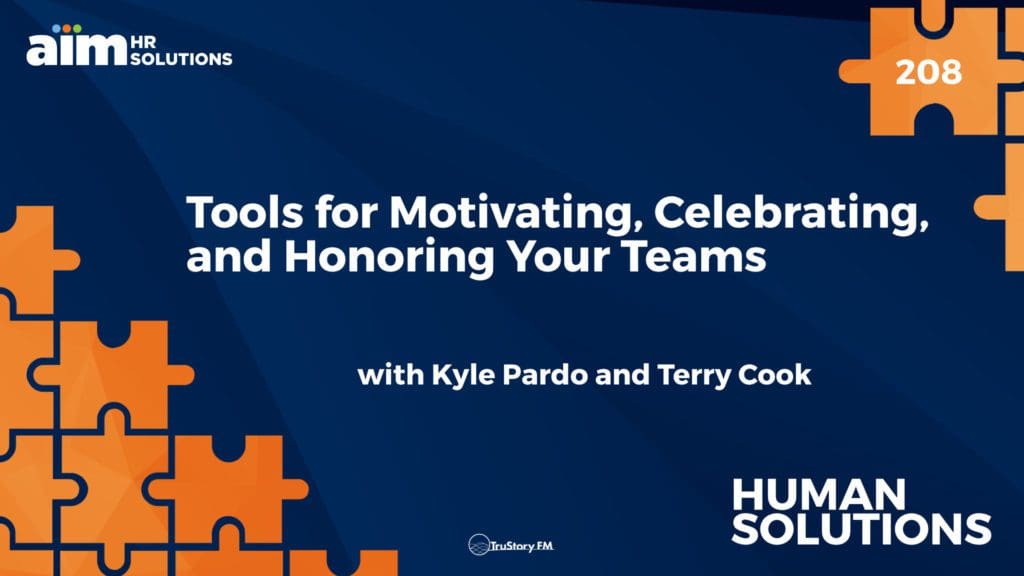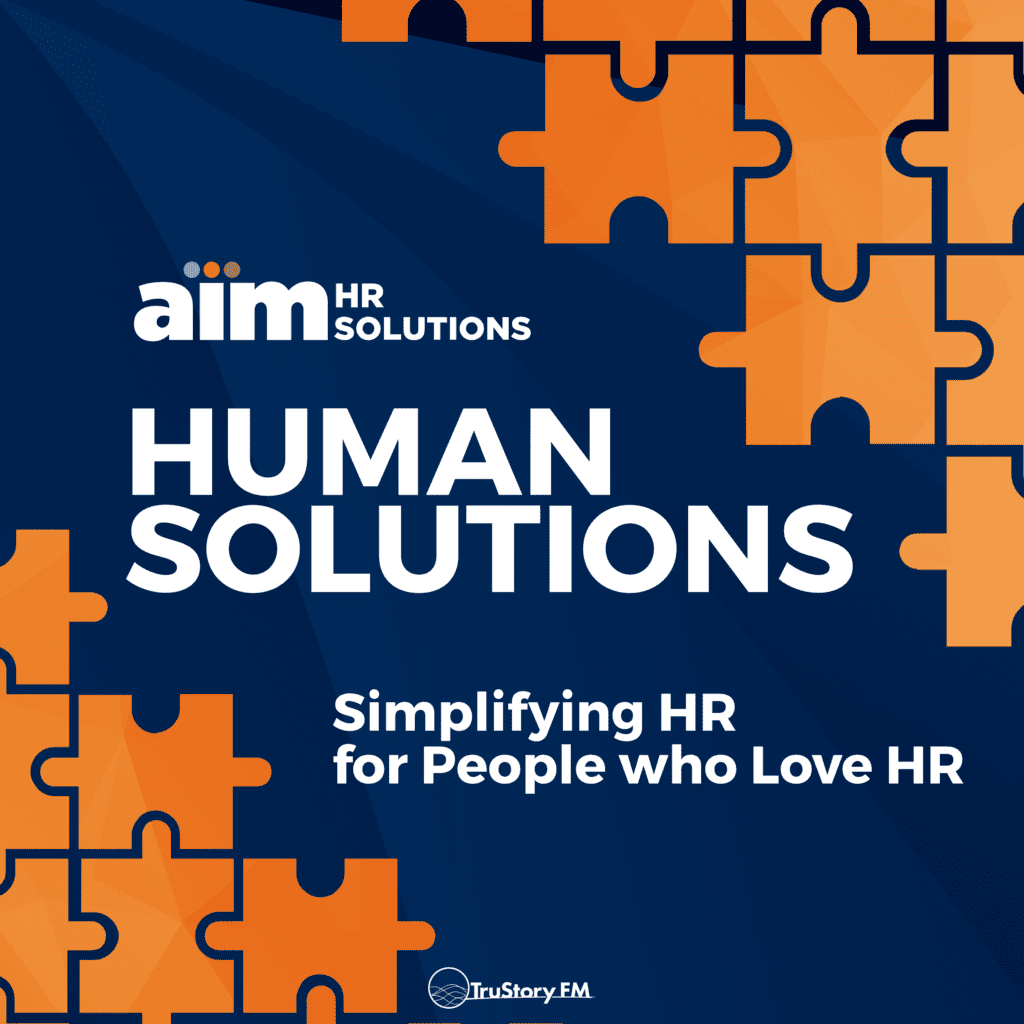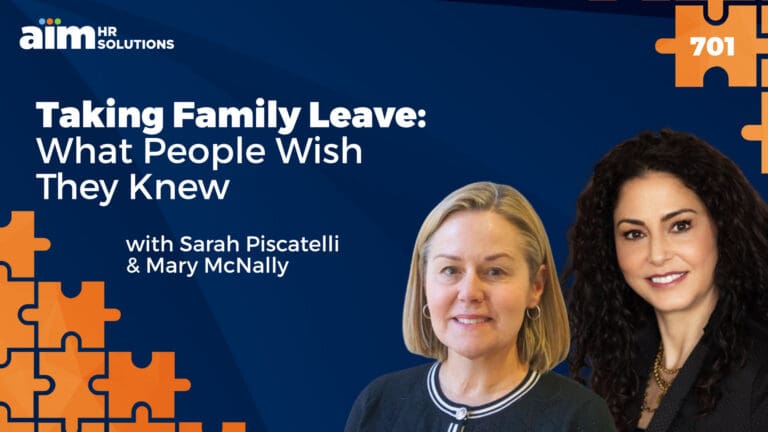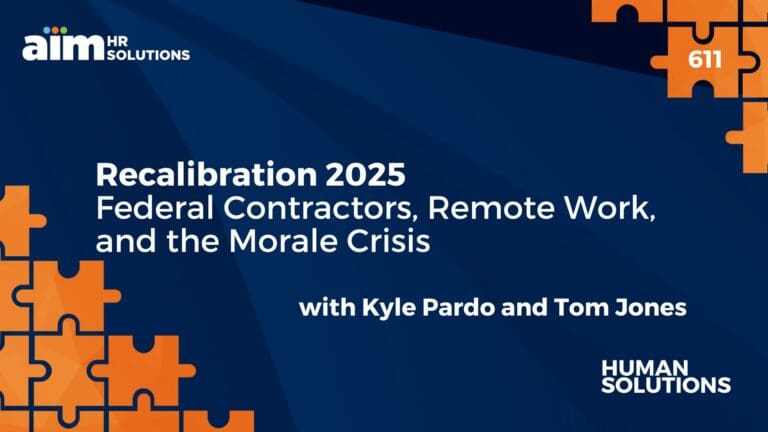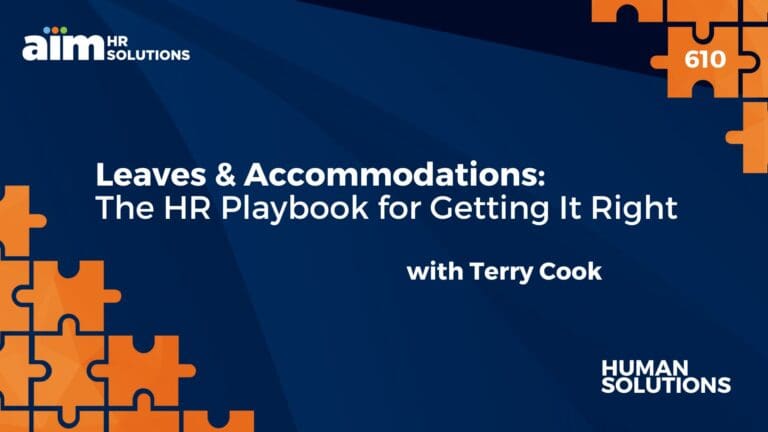If you’re a regular listener of the show, you might remember just a few weeks back we talked about Quiet Quitting… losing employees not by watching them walk out the door, but by showing up disengaged, disconnected from the work they’ve been hired to do. It’s a tricky problem. This week, we’re taking on the other side of that particular coin.
Cultivating a motivated workforce is the organization’s ultimate goal, especially in the face of extraordinary turnover across the employment market. So, what does it take to motivate an employee? What does HR need to take into consideration with employee recognition programs? This week Kyle Pardo and Terry Cook join Pete Wright for a conversation dedicated to helping you engage your teams today.
Links & Notes
- Gallup’s State of the Global Workplace: 2022 Report
- ‘Jury awards $450,000 to employee who declined birthday party’ — WINK News
- Learn More about AIM HR Solutions Training Opportunities for Your Teams
Episode Transcript
Pete Wright:
Welcome to Human Solutions. I’m Pete Wright. If you’re a regular listener of this show you might remember just a few weeks back, we talked about quiet, quitting, losing employees, not by watching them walk out the door, but by having them show up disengaged, disconnected from the work they’ve been hired to do. It’s a tricky HR problem. This week, we’re taking on the other side of that particular coin. Cultivating a motivated workforce is the organization’s ultimate goal, especially in the face of extraordinary turnover across the employment market. So what does it take to motivate an employee?
What does HR need to do to take into consideration with employee recognition programs? This week, our own employment impresarios, Kyle Pardo and Terry Cook, are here to help you start motivating your teams today. Terry, Kyle, welcome. It is so good to be talking to you again this week. We’re talking about motivating employees. Employees who are not engaged or who are actively disengaged cost the world 7.8 trillion in lost productivity according to Gallup’s State of the Global Workplace 2022 Report. That’s kind of a stunning figure. What does that take into consideration? Kyle, you want to kick us off?
Kyle Pardo:
Yeah, sure. It’s a couple of things. It goes back to that quiet quitting. Employees who are not fully engaged might be costing the company money in productivity. It might be bringing down the, I don’t know, the work ethic or the culture, the atmosphere of the company so it might leak over into other employees really not feeling engaged in the organization. Ultimately, if people aren’t engaged in and motivated, they may decide to quit. Then you have the whole cost of filling that position, so all you need is one person not feeling engaged and it can trickle over to other people.
Pete Wright:
Sure. Sure. It’s the exponential math kicks in, which is sometimes hard for us to keep in the back of our minds. The impact of one disengaged employee on the organizations, it spreads exponentially. It can potentially spread exponentially if we’re not on top of it. Okay, let’s then fix that problem. Terry, you’re here. You’re just going to fix it all for us. So what does it take to retain your existing talent? Let’s start building a bit of a wishlist. What does our fake manufacturing organization need to keep in mind to keep the people they have and keep them producing happily?
Terry Cook:
Yeah, I think as we’ve spoken about in previous podcasts, it’s really about listening and understanding that there could be a variety of needs that keep people engaged. It’s not like one-stop shopping or one-size-fits all when you’re trying to engage your workforce or motivate your workforce. It’s really about hearing and thinking and maybe giving options of ways to recognize people. It’s interesting, this came up not long ago on a call I had with a company where somebody had a work anniversary and they thought it would be nice to recognize people’s work anniversaries. We all would think, “Yeah, that sounds like a good plan.” Wrong. This employee was so mad at management and HR because they told the whole company how long this person had worked there. For that person, this made them feel like they were almost being called an older employee because they were being recognized for a lot of service, so HR had to jump in.
Same thing can happen with birthdays. We try to recognize birthdays. We don’t tell people their ages. Thankfully, human resources knows not to do that, but again, some people adjust are private people. So these are just some calls where if you as a company took one approach and said, “I’m only going to recognize people for their anniversaries”, or, “I want to show people I care by just recognizing them on a birthday,” it just is a few different examples of random employees that actually see that as the reverse. It might turn them to quiet quitting because they’re going to disengage from the workforce instead of seeing it as a reward or something that shows the company cares.
Kyle Pardo:
I’m going to take Terry’s story a step further. There was a case back about three years ago where a company celebrated an employee’s birthday. The employee knew that this was potentially going to happen and asked the company not to celebrate their birthday, but the company went ahead and did it anyway. The employee was embarrassed by it, and it caused anxiety to the point where the employee lashed out a bit and shared his discomfort in the situation and ultimately, was fired by the company for his poor behavior. The employee brought a claim against the company and was awarded $450,000 because this birthday celebration triggered his anxiety disorder. To Terry’s point, it’s knowing your employees, knowing the situation. I’m seeing Pete’s wide eyes at this example, but this happened in-
Pete Wright:
Gobsmacks. I am-
Kyle Pardo:
… 2019. Yeah.
Pete Wright:
… gobsmacked, Kyle.
Kyle Pardo:
Yes.
Pete Wright:
My God.
Kyle Pardo:
Yeah.
Pete Wright:
Wow. Wow.
Terry Cook:
So think about your employees. What you know might think is motivating in a nice-
Kyle Pardo:
That’s a good point.
Terry Cook:
… gesture might not come back the same way.
Pete Wright:
As somebody who lives with anxiety, I am not someone to question anybody else’s anxiety, right? Everybody’s anxiety is a perfect cornucopia of wonders for them. But I do think it’s important to at least acknowledge the recommendation. Don’t give the number of years, don’t do that. But is there still value of celebrating the seasoned nature of your workforce, of your team? They’ve been here a long time, they’re experts, they’re wise, all of those could connote age. Right?
Kyle Pardo:
Mm-hmm.
Pete Wright:
So how do you get around that, or are we just talking about superficial recognition that doesn’t really get to the root of motivation?
Terry Cook:
I think it’s still a matter of talking to your employees. Rather than doing maybe a public recognition, years ago, I would have a service awards luncheon is what we called it back then. We would take anybody that was hitting a milestone, which is, Kyle and I joked the other day, could be six months now in a year. But back then I had employees celebrating 30, 40 years with my company, and we would take all of those people and invite them to a lunch offsite where we would recognize them. Again, it’s an invitation, so if somebody really found anxiety or they really didn’t like that aspect, they just didn’t have to come. We didn’t push it, we just let it happen. We just said, “This is what we’re going to do at the luncheon.” At the time, we handed out these materials that let them pick a prize, so to speak, or pick a gift from the company.
It was actually seen by, I think, back then 99% of the people as something that was super positive. They looked forward to every year because they were invited to a special luncheon to acknowledge them as a group, and it was anybody that hit that milestone during the year. So the people that may not have wanted to be called out as a one or two people a month, they weren’t. They were in one group of anybody that celebrated a big anniversary that year. They got their free lunch, they got to network, they got the ability to get off of their workstations and relax for an hour. So I think in that example, it was just a matter of the way you handled it. You invited people, gave them the option to be out instead of having them sue you for anxiety as Kyle mentions. But it still was a reward or something that people saw as positive of those that attended.
Kyle Pardo:
No, I was just going to say, I think Terry made another really good point in and what she just said though is, years ago there would be a catalog, and when you hit 25th anniversary you might get a watch or a chair or whatever it might be. I think what’s different now is thinking about it in celebrating those six-month anniversaries and those one-year anniversaries because people might not work with you for their entire career like previously. So I think thinking about those shorter term celebrations is a good thing to consider.
Pete Wright:
Oh, yeah. But the whole scale whole changed.
Terry Cook:
Yes.
Kyle Pardo:
Yeah.
Pete Wright:
Well, the other thing that I really want to acknowledge about this, and this goes into another Pete’s past life story, which is worked for a former company that did that. I had been there for 10 years and it was time to get a watch or something. I get this email from HR saying, “Congratulations. We really are proud of you. You’ve been a great team member all this time. You’ve done great work. Here is our catalog. You can select from anything in here. There’s a silver watch, there’s pins, there’s whatever you want, it’s all yours.” At the bottom of the email it said, “Please do not reply to this email. This inbox is not monitored by any human at all.”
It was the biggest joke of recognition because they were just giving me stuff. There was no humanity to it, I think that’s a part of it. Inviting someone to a lunch or making sure that at a bare minimum a human being is responding to emails that are coming to offer you a gift, it makes it less of a joke. Like it was a joke. It made seniority at the organization lampoonable, and that’s a really sad place to be. I think that for me, the lesson here is just remember the humanity in recognition. That’s really important.
Kyle Pardo:
Absolutely. I think as some companies think about it and they think they may not have a budget for these types of motivational gifts or luncheons or things like that, sometimes it’s the note, the handwritten note from a supervisor or something that says, “Thank you,” or, “We’re celebrating your accomplishment,” or whatever it might be, so I think you’re absolutely right. It’s keeping that humanity in it and not making it a formal process that a computer has taken over for you.
Terry Cook:
It doesn’t have to be even a supervisory or human resources or even management-led. I’ve seen some very, I guess, good recognition programs where coworkers were able to recognize each other, so they were able to hand something in to a manager or human resources department saying, “Kyle did this wonderful thing for me, and I just want to recognize Kyle.” Sometimes recognition from coworkers means a lot to them too, not just a milestone recognition as an anniversary or a birthday might be, so some random recognition. To Kyle’s point, it doesn’t have to cost a lot of money. Sometimes it’s just the recognition that somebody selected you. In my experience in the past, the coworker recognitions meant more to them than the watch, as you said-
Pete Wright:
Oh, sure. Yeah.
Terry Cook:
… Pete.
Pete Wright:
Yeah. Who needs another logo watch is all I’m saying?
Kyle Pardo:
We won’t get you one Pete, okay?
Pete Wright:
Please don’t get me a watch.
Kyle Pardo:
Okay.
Pete Wright:
So that’s some notes on the recognition side, but there is this other side of keeping well-engaged and motivated employees, and that’s the actual environment in which they’re doing the job. What is it that helps to build that culture for employees to be motivated in the seat where they’re actually doing the job regardless of how long they’ve been there or when their birthday is?
Kyle Pardo:
I think there are a couple of things there. We all want to do jobs that we like, and by that it could be the job itself. So is there room for growth? Is there room for learning, professional development, cross training, learning from a co-worker? Sometimes for individuals that’s motivating to be able to take on new projects and new experiences. I think the environment itself, so where you actually sit or where you go every day, and if that’s remote or if that’s in person, is that a place that you want to be? I think I’m easy to think about really what does the day-to-day look like for an employee to keep people motivated.
Terry Cook:
I agree and I think to build off of what we said on quiet quitting, it’s about how much you appreciate them, how much you show you appreciate them, how your boss recognizes what you’re doing, how you’re thanked for doing what may be just your regular everyday job. So just really somebody that’s listening, that is interested in not only maybe your work skills, but your what’s going on in your life so that they feel like they’re heard by work, but they’re also heard as a person in the organization.
Pete Wright:
The act of recognizing employees for their just day-to-day, I think takes some different … has different flavors to it. One of the pieces we use around our house, just as our little microculture of our families, you can ask me to do something or tell me how to do something I’m trying to do but don’t know how to do, but you can’t do both. Doing both, telling me what to do and how to do it does not allow me any agency in the work that I’m doing. I often think in certain ranks across organizations that can be forgotten that some of the greatest value we get out of showing up every day is being able to demonstrate that we have capacity, capability, and strength to make decisions, have autonomy and show our own agency in the work we do. What’s your thought on that? Am I just spinning out of control here?
Terry Cook:
No, I think autonomy means a lot to a lot of people so they can show what they’re able to do, and I also think managers that are open to suggestions. Kyle’s great about that with our group. She doesn’t try to squash our creativity or our ideas, not to say we can do every one of them, but just having somebody that’s open to listen is very energizing. I’ve had co-workers come to me and say that. They’re like, “I can’t believe the new energy I feel because people are listening to what I might have as an idea.” So it doesn’t mean they expect us to put them all in place, it just means that they’re heard and that they’re recognized as somebody that might have a good idea to contribute to the company. To your point, be it, I think anybody can contribute like that.
Kyle Pardo:
I remember a job I had, this is back in high school, working in a gift shop, like a card store, and everybody was in charge of a different area. So somebody was in charge of making sure the cards were all straight, somebody was in charge of the puzzles, somebody was in charge of making sure the mugs all faced the right way, and it became a sense of pride. It wasn’t any difficult job, it wasn’t a high visibility job, but it all contributed to the overall goal of the store. I think when people have that ownership of something, it makes you feel proud of the way it looks and gives you that connectedness, I guess.
Pete Wright:
Kyle, as leader of the organization, what is it that gives you pride in your organization in the work that you do every day?
Kyle Pardo:
Ultimately, it’s making sure that we’re helping companies, that we’re doing HR consulting. We know that the HR departments are facing a lot of challenges through COVID, but behind the scenes, it’s seeing people on our team come up with new ideas and trying them out and seeing if they work. As Terry said, we have a culture where people can throw out an idea, and if we all agree that it’s something we’re going to move forward on, we’re all in. If it works, great, we’re all going to celebrate it, and if it doesn’t work, we’re all together going to go back and look at it and figure out why it didn’t work. It’s supporting each other that once we’ve made a decision that that’s what we’re committing to, and ultimately, it’s all the end goal of helping our members and our clients.
Pete Wright:
Terry, what’s your shelf full of mugs?
Terry Cook:
Kyle knows I have too many ideas sometimes, but no, I think what Kyle’s saying is right. I just think all of us, especially on our team, we have such a goal of wanting to be a help and a resource to people that we’re constantly trying to shift our minds into the minds of our customer and saying, “Okay, when I’m there, what do I need, or what would be something that would feel like a help to me?” So we’re not trying to just say, “Okay, well this is the only thing we’re going to offer you. This is what we are telling you need.” So we’re listening and we’re constantly trying to relate to what the needs might be because I do think everybody enjoys helping others. Everybody on our team likes to show a difference in people for their companies and making their lives easier. I think all of that’s something that’s motivating.
Pete Wright:
What I love hearing about both of you reflect on your own shelves of mugs is that part of the hidden message is, look at the great ideas around you and get out of the way.
Terry Cook:
True.
Pete Wright:
So much of this is letting ideas flourish on the team and across the team and for customers. That’s one of the things that I think can really stymie. The flow of ideas across the team is just getting in our way because of, “This is how it’s been done,” or, “These are the people who have to do this one thing,” and for whatever reason, we can find an excuse not to do something, not to try new things.
Terry Cook:
Really good point, Pete. Love it when people come and they say, Why have we been doing it that way? Couldn’t we just get rid of this step and make it faster? It’s like an “aha” moment of, yes, we absolutely can it. So I love when people question, “Why have we done it that way?
Pete Wright:
As we get toward wrapping up, we’ve already talked about, don’t do anything to get you sued for one of your team members’ anxiety, let’s avoid that. Any other “gotchas” for our HR pros who are looking for ways to motivate their teams? Any other “gotchas” they need to maybe tread carefully around?
Kyle Pardo:
We sometimes say, “No good turn goes unpunished,” or whatever the phrase is. We’ve talked to companies who have said, “We’ve given out Thanksgiving turkeys for years, we’ve decided we’re not going to give them this year.” While people maybe weren’t super excited about their turkey, as soon as you stop doing it, then people say, “Where did the turkey go?”
Pete Wright:
Right.
Kyle Pardo:
“How come we don’t get a turkey this year,” or when you do do it, people might say, “I don’t even like turkey. I wish I could get something else.” it’s nice if you have the opportunity to have a couple of different options that that’s one thing and saying, “Would you rather have a pie or a turkey?” And let people have a choice, sometimes that’s a good way to go. But keep in mind it’s going to be difficult sometimes to make everybody happy and you’re going to do your best that you can.
Terry Cook:
Yeah, no, I would agree. If you can have options, that’s great, but if you can’t just really listen and try to see what your decisions, how they might impact. To Kyle’s point, some people might say the turkey is something their family may count on every year, and a company doesn’t know that. They just know that they think it was a lot of work. I experienced it at one of my companies. I would literally, Pete, sit in the back of a truck and hand out refrigerated turkeys for a half-a-day, and you’d get the people that were super appreciative.
You’d get the people that, like Kyle said, that don’t like turkey. You’d get the people saying that, “John’s turkey is a half pound bigger than mine.” So you’d get the whole realm of it. But at the end of the day, every single year, people would come up and say, “That meant the world to my family.” Again, it’s not a high-cost thing and it may be people just don’t think it’s important, but really try to find out what might be important to your employees, and if you have to make a change, talk about it instead of just making the change and walking away and pretending it never happened.
Pete Wright:
I had a CEO I worked for once who called this the Christmas vacation rule. Are you familiar with National Lampoon’s Christmas Vacation?
Kyle Pardo:
Yes, I am.
Pete Wright:
At the end of the movie, Clark discovers that his annual bonus for Christmas was replaced with a subscription to the Jelly of the Month Club without talking to him. This president of this company, this consulting company I worked for said, “I have never forgotten that, how disruptive that can be. Any program you put in place, make sure it is sustainable and passes the Christmas vacation test. You don’t want to give somebody the Jelly of the Month Club when they’re counting on being able to put in a new pool.”
Kyle Pardo:
That’s a very good thought.
Terry Cook:
I like that.
Pete Wright:
On that note, thank you both so much for this dose of generosity and recognition for teams. As always, you are both so wise and so helpful and we sure appreciate you. I assume if we send people to aimhrsolutions.com, we’ll put the link in the show notes. They can find some resources there. Is there anything you would like specifically to point folks to to learn more about?
Kyle Pardo:
No, and you’d want to take a look at some of our training classes. We do have classes in there on motivating employees, and so if that’s something you want to learn more about, that might be a good program for you to check out.
Terry Cook:
Or if you want to use training as a motivator, a way to help them grow to maybe reach the next goal in their career, that’s something that we can help with as well.
Pete Wright:
Outstanding. Thank you both so much, Terry Cook, Kyle Pardo, and thank you all for downloading and listening to this show. We sure appreciate your time and your attention. As always, you can find the links and notes about the show at amrsolutions.com or just check the show notes. I’ll put it all in there. You can listen to the show right there on the website or subscribe anywhere you find your podcasts. On behalf of Kyle and Terry and everybody at the AMR Solutions team, I’m Pete Wright. We’ll catch you back here next week on Human Solutions, simplifying HR for people who love HR.







